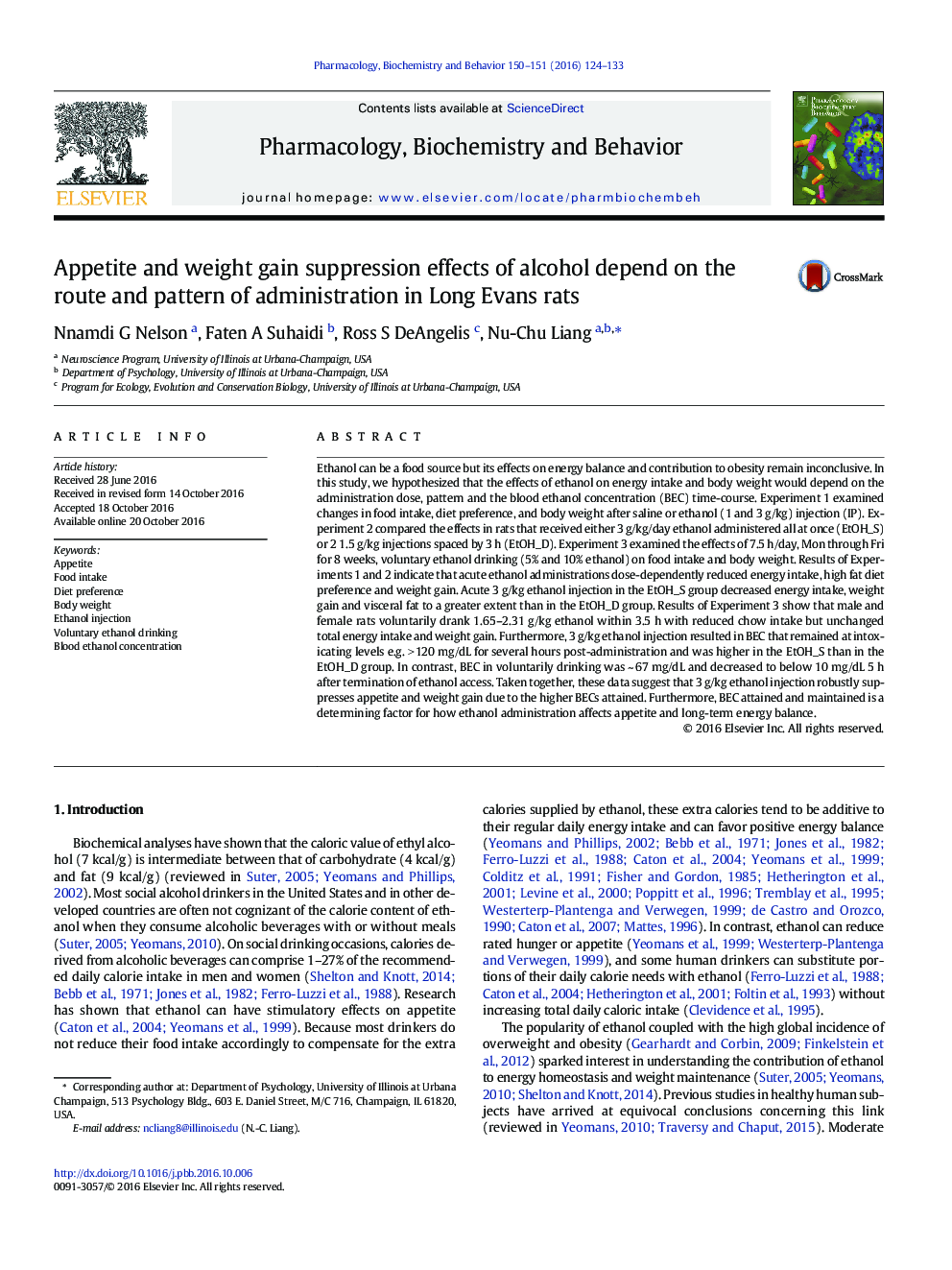| کد مقاله | کد نشریه | سال انتشار | مقاله انگلیسی | نسخه تمام متن |
|---|---|---|---|---|
| 8350290 | 1541836 | 2016 | 10 صفحه PDF | دانلود رایگان |
عنوان انگلیسی مقاله ISI
Appetite and weight gain suppression effects of alcohol depend on the route and pattern of administration in Long Evans rats
ترجمه فارسی عنوان
اثرات سرکوب اشتها و افزایش وزن الکل بستگی به مسیر و الگوی مصرف در موش های صحرایی لانگ ایوانز دارد
دانلود مقاله + سفارش ترجمه
دانلود مقاله ISI انگلیسی
رایگان برای ایرانیان
کلمات کلیدی
اشتها مصرف غذا، ترجیح رژیم غذایی، وزن بدن، تزریق اتانول، نوشیدن اتانول داوطلبانه، غلظت اتانول خون،
موضوعات مرتبط
علوم زیستی و بیوفناوری
بیوشیمی، ژنتیک و زیست شناسی مولکولی
زیست شیمی
چکیده انگلیسی
Ethanol can be a food source but its effects on energy balance and contribution to obesity remain inconclusive. In this study, we hypothesized that the effects of ethanol on energy intake and body weight would depend on the administration dose, pattern and the blood ethanol concentration (BEC) time-course. Experiment 1 examined changes in food intake, diet preference, and body weight after saline or ethanol (1 and 3Â g/kg) injection (IP). Experiment 2 compared the effects in rats that received either 3Â g/kg/day ethanol administered all at once (EtOH_S) or 2 1.5Â g/kg injections spaced by 3Â h (EtOH_D). Experiment 3 examined the effects of 7.5Â h/day, Mon through Fri for 8Â weeks, voluntary ethanol drinking (5% and 10% ethanol) on food intake and body weight. Results of Experiments 1 and 2 indicate that acute ethanol administrations dose-dependently reduced energy intake, high fat diet preference and weight gain. Acute 3Â g/kg ethanol injection in the EtOH_S group decreased energy intake, weight gain and visceral fat to a greater extent than in the EtOH_D group. Results of Experiment 3 show that male and female rats voluntarily drank 1.65-2.31Â g/kg ethanol within 3.5Â h with reduced chow intake but unchanged total energy intake and weight gain. Furthermore, 3Â g/kg ethanol injection resulted in BEC that remained at intoxicating levels e.g. >Â 120Â mg/dL for several hours post-administration and was higher in the EtOH_S than in the EtOH_D group. In contrast, BEC in voluntarily drinking was ~Â 67Â mg/dL and decreased to below 10Â mg/dL 5Â h after termination of ethanol access. Taken together, these data suggest that 3Â g/kg ethanol injection robustly suppresses appetite and weight gain due to the higher BECs attained. Furthermore, BEC attained and maintained is a determining factor for how ethanol administration affects appetite and long-term energy balance.
ناشر
Database: Elsevier - ScienceDirect (ساینس دایرکت)
Journal: Pharmacology Biochemistry and Behavior - Volumes 150â151, NovemberâDecember 2016, Pages 124-133
Journal: Pharmacology Biochemistry and Behavior - Volumes 150â151, NovemberâDecember 2016, Pages 124-133
نویسندگان
Nnamdi G Nelson, Faten A Suhaidi, Ross S DeAngelis, Nu-Chu Liang,
